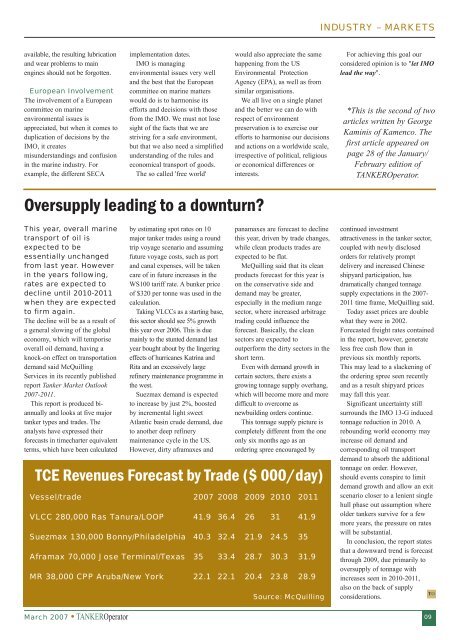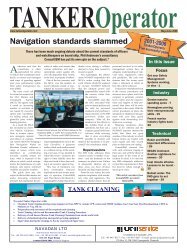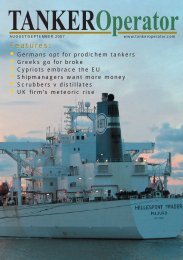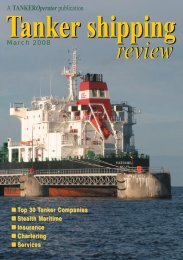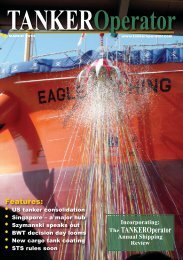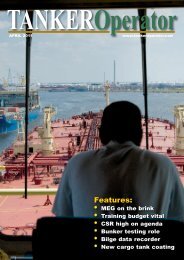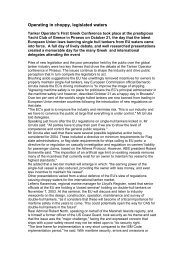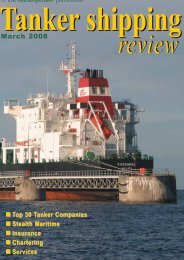Download - Tanker Operator
Download - Tanker Operator
Download - Tanker Operator
Create successful ePaper yourself
Turn your PDF publications into a flip-book with our unique Google optimized e-Paper software.
INDUSTRY – MARKETS<br />
available, the resulting lubrication<br />
and wear problems to main<br />
engines should not be forgotten.<br />
European Involvement<br />
The involvement of a European<br />
committee on marine<br />
environmental issues is<br />
appreciated, but when it comes to<br />
duplication of decisions by the<br />
IMO, it creates<br />
misunderstandings and confusion<br />
in the marine industry. For<br />
example, the different SECA<br />
implementation dates.<br />
IMO is managing<br />
environmental issues very well<br />
and the best that the European<br />
committee on marine matters<br />
would do is to harmonise its<br />
efforts and decisions with those<br />
from the IMO. We must not lose<br />
sight of the facts that we are<br />
striving for a safe environment,<br />
but that we also need a simplified<br />
understanding of the rules and<br />
economical transport of goods.<br />
The so called 'free world'<br />
would also appreciate the same<br />
happening from the US<br />
Environmental Protection<br />
Agency (EPA), as well as from<br />
similar organisations.<br />
We all live on a single planet<br />
and the better we can do with<br />
respect of environment<br />
preservation is to exercise our<br />
efforts to harmonise our decisions<br />
and actions on a worldwide scale,<br />
irrespective of political, religious<br />
or economical differences or<br />
interests.<br />
For achieving this goal our<br />
considered opinion is to "let IMO<br />
lead the way".<br />
*This is the second of two<br />
articles written by George<br />
Kaminis of Kamenco. The<br />
first article appeared on<br />
page 28 of the January/<br />
February edition of<br />
TANKER<strong>Operator</strong>.<br />
Oversupply leading to a downturn?<br />
This year, overall marine<br />
transport of oil is<br />
expected to be<br />
essentially unchanged<br />
from last year. However<br />
in the years following,<br />
rates are expected to<br />
decline until 2010-2011<br />
when they are expected<br />
to firm again.<br />
The decline will be as a result of<br />
a general slowing of the global<br />
economy, which will temporise<br />
overall oil demand, having a<br />
knock-on effect on transportation<br />
demand said McQuilling<br />
Services in its recently published<br />
report <strong>Tanker</strong> Market Outlook<br />
2007-2011.<br />
This report is produced biannually<br />
and looks at five major<br />
tanker types and trades. The<br />
analysts have expressed their<br />
forecasts in timecharter equivalent<br />
terms, which have been calculated<br />
by estimating spot rates on 10<br />
major tanker trades using a round<br />
trip voyage scenario and assuming<br />
future voyage costs, such as port<br />
and canal expenses, will be taken<br />
care of in future increases in the<br />
WS100 tariff rate. A bunker price<br />
of $320 per tonne was used in the<br />
calculation.<br />
Taking VLCCs as a starting base,<br />
this sector should see 5% growth<br />
this year over 2006. This is due<br />
mainly to the stunted demand last<br />
year bought about by the lingering<br />
effects of hurricanes Katrina and<br />
Rita and an excessively large<br />
refinery maintenance programme in<br />
the west.<br />
Suezmax demand is expected<br />
to increase by just 2%, boosted<br />
by incremental light sweet<br />
Atlantic basin crude demand, due<br />
to another deep refinery<br />
maintenance cycle in the US.<br />
However, dirty aframaxes and<br />
panamaxes are forecast to decline<br />
this year, driven by trade changes,<br />
while clean products trades are<br />
expected to be flat.<br />
McQuilling said that its clean<br />
products forecast for this year is<br />
on the conservative side and<br />
demand may be greater,<br />
especially in the medium range<br />
sector, where increased arbitrage<br />
trading could influence the<br />
forecast. Basically, the clean<br />
sectors are expected to<br />
outperform the dirty sectors in the<br />
short term.<br />
Even with demand growth in<br />
certain sectors, there exists a<br />
growing tonnage supply overhang,<br />
which will become more and more<br />
difficult to overcome as<br />
newbuilding orders continue.<br />
This tonnage supply picture is<br />
completely different from the one<br />
only six months ago as an<br />
ordering spree encouraged by<br />
TCE Revenues Forecast by Trade ($ 000/day)<br />
Vessel/trade 2007 2008 2009 2010 2011<br />
VLCC 280,000 Ras Tanura/LOOP 41.9 36.4 26 31 41.9<br />
Suezmax 130,000 Bonny/Philadelphia 40.3 32.4 21.9 24.5 35<br />
Aframax 70,000 Jose Terminal/Texas 35 33.4 28.7 30.3 31.9<br />
MR 38,000 CPP Aruba/New York 22.1 22.1 20.4 23.8 28.9<br />
Source: McQuilling<br />
continued investment<br />
attractiveness in the tanker sector,<br />
coupled with newly disclosed<br />
orders for relatively prompt<br />
delivery and increased Chinese<br />
shipyard participation, has<br />
dramatically changed tonnage<br />
supply expectations in the 2007-<br />
2011 time frame, McQuilling said.<br />
Today asset prices are double<br />
what they were in 2002.<br />
Forecasted freight rates contained<br />
in the report, however, generate<br />
less free cash flow than in<br />
previous six monthly reports.<br />
This may lead to a slackening of<br />
the ordering spree seen recently<br />
and as a result shipyard prices<br />
may fall this year.<br />
Significant uncertainty still<br />
surrounds the IMO 13-G induced<br />
tonnage reduction in 2010. A<br />
rebounding world economy may<br />
increase oil demand and<br />
corresponding oil transport<br />
demand to absorb the additional<br />
tonnage on order. However,<br />
should events conspire to limit<br />
demand growth and allow an exit<br />
scenario closer to a lenient single<br />
hull phase out assumption where<br />
older tankers survive for a few<br />
more years, the pressure on rates<br />
will be substantial.<br />
In conclusion, the report states<br />
that a downward trend is forecast<br />
through 2009, due primarily to<br />
oversupply of tonnage with<br />
increases seen in 2010-2011,<br />
also on the back of supply<br />
TO<br />
considerations.<br />
March 2007 • TANKER<strong>Operator</strong> 09


